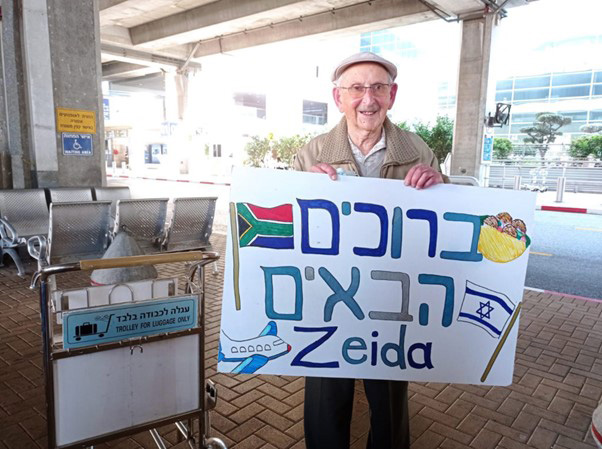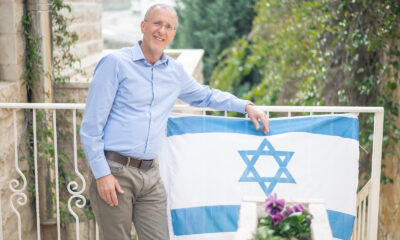
Featured Item

Olim welcome after retirement – but it’s a major life transition
“Israel will never say no to any Jewish person who wants to make aliya, certainly not to older Jews. The reason the country exists is to be a home for Jewish people.”
So says Tanya Ofek, an aliya consultant at the Israel Centre. She spoke to the SA Jewish Report following a webinar about “elderly aliya” on 15 May, organised by the Israel Centre and other organisations including the Jewish Agency for Israel and Gvahim Aliyah Prep.
“The only reason Israel may refuse to allow a Jewish person to make aliya is if you committed a crime, or if you were Jewish and you openly practice a different religion,” says Ofek. “Obviously, when you come to the actual process of making aliya, you’ll be asked questions like how you’re going to sustain yourself, do you have a support system, and so on. But they won’t stop you from making aliya even though you’re at pension age or after pension age.
“Making aliya is a major life transition, especially at this age,” says Telfed social worker Ariela Siegel, speaking on the webinar. “There are many considerations to take into account, many questions that one needs to clarify prior to taking this step.”
Siegel says making aliya starts with planning and gathering all the information so you can be prepared and more likely to succeed.
“One of the most important aspects you should be looking at is how emotionally and mentally prepared you are for this and, in fact, how determined you are to make this transition and make it work. There are many obstacles to overcome, so you need sources of support. It’s either family, friends, state support, personnel resources, financial or other, and also various organisations, such as Telfed that offer help for olim.”
Siegel says it’s important to make realistic financial plans and research the cost of living in Israel. “Some of the rights and benefits like the old-age pension aren’t always automatic and can be given only if you meet certain criteria.”
Ofek says most retirement homes are expensive. “If you can’t do daily tasks and you’re in a position where you need to be cared for fully, then you can get into a public retirement home where they take care of you. But if you’re still okay, it’s a real problem if you don’t have money.”
Ofek says that when someone who is beyond retirement age wants to make aliya but doesn’t have money or any means of supporting themselves, the Israel Centre usually says it’s much wiser to stay in South Africa.
“Another important consideration when making aliya is your health and what health services you can expect in Israel,” says Siegel. “Even if the condition is stable now, no one knows what happens in the future. It’s important to know that old-age homes, assisted living arrangements, 24/7 caregivers for the frail, and all these kinds of services aren’t all state-funded.”
Siegel says other considerations when making aliya include finding the right place for you to settle and learn the language. “I know that learning Hebrew at an older age is a challenge, but it’s still very worthwhile to invest in.”
Rafael Schorr, a logistics project manager at Israel Experience, told the webinar that immigrants are eligible for an absorption basket for six months after receiving immigration status. This assistance is provided by the ministry of aliya and immigration. At the airport, retired elderly citizens or those in activity receive 1 250 shekels (R5 937) in cash if they are single, or 2 500 shekels (R11 874) if they are a couple. After they open an account in a bank, they receive 1 443 shekels (R6 853) if they are single or just more than 3 600 shekels (R17 098) if they’re a couple. They then receive six payments, one each month.
The ministry of housing offers rent to olim during their first five years of immigration, says Schorr.
Retiree ulpan studies are subsidised by the aliya ministry for 10 months, three times a week, five hours a day.
Those who receive pension or retirement supplements because they don’t have a job or don’t have property in their name in Israel are eligible to receive discounts on essential services such as electricity and water, says Schorr.
Municipal tax discounts are also available. Each municipality has certain co-ordinators who are responsible for offering recreational or leisure activities for free or subsidies.
Schorr says there’s no tax for 10 years on non-Israel sourced (generated abroad) income. After the 10-year tax exemption, your pension tax will be equal to or less than your home country.
In terms of senior housing and elderly care, Schorr says Israel has different options. There are independent senior living centres, old-age homes, mentally frail facilities, and assisted living facilities.
Schorr says Israel’s social services ministry offers the elderly who aren’t in an elderly facility a long-term care benefit to help with daily activities and/or a full-time nursing professional. The ministry is also responsible for the Kartis Ezrach Vatik, an Israel senior-citizen card which offers various discounts and benefits.
And the social welfare ministry allocates another card which gives those older than 80 the right to receive customer service without waiting in line at places like banks, post offices, and large stores.










